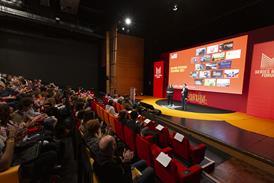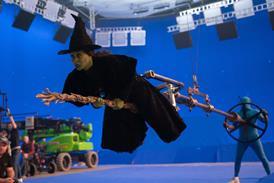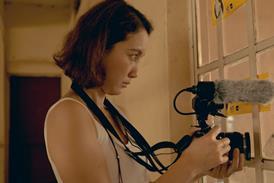The North African country has long been popular with international directors shooting on location, but since this year’s revolution the local industry is looking to expand.
On a Saturday afternoon in downtown Tunis at the beginning of October, the Colisée cinema on the Tunisian capital’s swanky Avenue Habib Bourguiba is screening Harry Potter And The Deathly Hallows: Part 2. It is the only new Western picture to have been released theatrically in Tunisia since a popular uprising overthrew dictator Zine El Abidine Ben Ali on January 14.
The 1,800-seat Colisée (Colosseum), described by posters in its entrance hall as the Queen of Theatres, is one of just 14 screens operating in Tunisia for a population of some 10.6 million people. And during this pleasant autumn afternoon, the theatre is practically empty.
In a nearby side street, a shop selling counterfeit DVDs — one of 70,000 such outlets in the country —displays illegal copies of Pirates Of The Caribbean: On Stranger Tides, Due Date and Green Lantern for $1.40 (tnd2) apiece.
“With so much piracy, there is no incentive for anyone to invest in theatres,” says Colisée owner Lassaad Goubantini, who sells tickets for $2 (tnd3).
According to veteran producer Hassen Daldoul, the illegal DVD distributors are so well organised they even have a union affiliated with UTICA, the official umbrella body for the country’s business and industry.
‘With so much piracy, there is no incentive to invest in theatres’
Lassaad Goubantini, Colisee cinema
Back on Avenue Habib Bourguiba, the wide pavements are packed with people, some window shopping, others scrutinising political-party posters stuck on walls ahead of the first democratic vote in 25 years. The vote at the end of October is for an assembly to write a new constitution for the country, paving the way for elections next year.
The previously banned Islamist party Ennahda is expected to take up to 30% of the vote and may try to introduce a mild form of sharia law. Its members are out in force, canvassing in the city centre, not far from the notorious Interior Ministry building, once home to Ben Ali’s secret police, which is surrounded by tanks, barbed wire and soldiers.
At the other end of the avenue, in the Tunisia Palace Hotel, director Nawfel Saheb-Ettaba is pitching his feature project Baccalauréat to a group of French producers at the first Franco-Tunisian co-production forum, organised by France’s CNC, Unifrance and the Tunisian producers’ body, CSNPF. A French protectorate from 1881-1956, Tunisia has retained strong cultural and linguistic ties with France and earlier this year, the CNC advised Tunisia on how to set up its own national cinema centre.
Saheb-Ettaba’s project revolves around a teenager who sets off on an illegal trip across the Mediterranean to Europe in search of a better life. “It upsets me to see so many young people setting off like this full of hope, only to die anonymously out at sea,” the director tells the French producers who include Marc Bachet of ASAP, Guillaume de Seille of Arizona, and Nadim Cheikhrouha and Yves Chanvillard of Screen Runner. “A year or two back, a number of corpses were washed up on the beach near my house in Marsa and since then I have wanted to make this film.”
‘We could create a network of 200 screens’
Lotfi Layouni, CSNPF
Baccalauréat will be Saheb-Ettaba’s third feature following El Kotbia and Black Moon, which is in post. At present, Tunisia makes one or two low-budget local pictures a year. Its independent producers would like to increase this to 10 films annually. The Tunisian state currently sets aside some $3.4m (€2.5m) a year for local productions. But one of the key challenges facing the industry is how to increase the number of legal screening venues in the face of rampant piracy, says veteran producer Lotfi Layouni, who is vice-chairman of the CSNPF.
The body is lobbying the minister of culture to turn screening facilities situated inside the country’s 200 state-run cultural centres over to the legal commercial exploitation of theatrical films.
“About 40 of these ‘maisons de la culture’ already have proper screening facilities with 200-600 seats. Another 160 venues could easily be equipped,” explains Layouni. “That would make a network of some 200 screens, against the 14 functioning theatres today.”
The Quinta factor
The other side of Tunisia’s film industry is the well-financed activities of Tunisia-born, Paris-based entertainment mogul Tarak Ben Ammar and his Quinta Communications group. Over the past two decades he has brought in big-budget international productions such as Star Wars: The Phantom Menace, The English Patient and, most recently, Jean-Jacques Annaud’s epic picture Black Gold, about two warring emirs in the 1930s, to shoot in the country.
Quinta owns two studio facilities, which service mainly foreign productions. Both Empire Studios — which is co-owned by Italian production house Lux Vide — near the coastal resort of Hammamet, and Carthage Studios in the Ben Arous neighbourhood on the outskirts of Tunis have remained operational throughout this turbulent year. At the height of the revolution in January, Annaud continued shooting Black Gold at Hammamet.
Italian director Giacomo Campiotti has been shooting Rai Trade’s mini-series Maria Di Nazareth, starring Paz Vega as Mary Magdalene, at the studios since mid-September.
Quinta’s smaller Carthage Studios facility is presently lying empty. Props of planes and tanks, relics of the Black Gold shoot in Hammamet, lie about the sets. Curtains masking non-existent interiors rise and fall in the breeze.
The set was originally built in the style of a Sicilian town for Giuseppe Tornatore’s Baaria in 2008 and then given an Algerian and Parisian makeover for Rachid Bouchareb’s foreign-language Oscar-nominated Outside The Law, about Algeria’s fight for independence from France after the Second World War.
French director Alexandre Arcady re-used the studio for his adaptation of Yasmina Khadra’s What The Day Owes The Night, which also unfolds against the backdrop of the Algerian struggle for independence. The production wrapped at the end of July.
“We’ve hosted three film productions since the revolution… but a lot of producers are waiting to see how things pan out here, especially after the elections,” says Nabil Kila, managing director of Quinta Productions in Tunisia.
There is little love lost between Paris-based Ben Ammar and his film-making compatriots. Many believe the media tycoon should do more to support Tunisian cinema and also drop the rates at his studios for local productions.
“They don’t seem to understand that Mr Ben Ammar is a businessman. They all want something for free,” counters Kila.
Some local producers describe Ben Ammar’s announcement he will produce an Arab-language feature about Mohamed Bouazizi, the man whose self-immolation sparked the revolution, as an opportunistic publicity stunt.
Respected local director Mohamed Zran, who is attached to the project says: “People like to gossip but this sort of talk doesn’t get us anywhere… We have the agreement of Mohamed Bouazizi’s mother and the script is well underway. We don’t have a shoot date yet. Everything is on hold until after the elections.”
In the meantime, Zran is finishing post-production on his revolution documentary Digage!. Zran explains the title is derived from the way ordinary Tunisians pronounce “degage” (“get lost”), Tunisia’s now famous revolutionary slogan, chanted by the crowds back in January as they called for Ben Ali’s departure.



















No comments yet